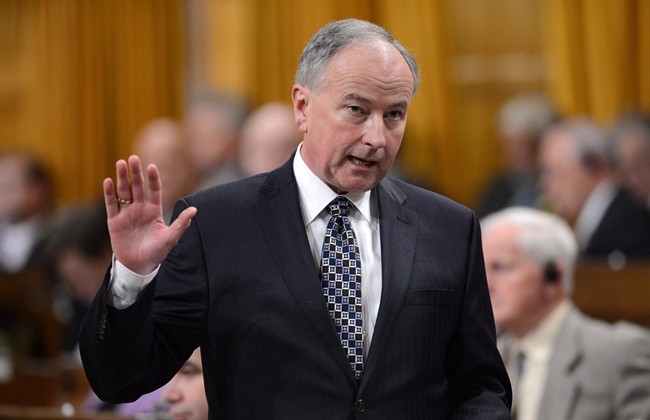OTTAWA – The complexity of including the perspective of victims in Canada’s criminal justice system was encapsulated nicely Thursday in a single, 24-minute news conference on Parliament Hill.

And it highlighted a question that too often goes unasked in official Ottawa: When does justice for victims become Old Testament vengeance on criminals?
“It’s taken years for victims to try to get the message out that we are not these angry, vengeful people,” said Sharon Rosenfeldt, whose 16-year-old son Daryn was one of the victims of serial killer Clifford Olsen in 1981.
“However, there is victimization whether you want to accept it or not. There is an aftermath to crime.”
Rosenfeldt was on hand as the Conservative government announced it would back a private member’s bill designed to keep some killers behind bars for up to 40 years before becoming eligible for parole.
The measure, which capped the eighth annual Victims of Crime Week in Ottawa, is the work of Manitoba Conservative MP James Bezan, who says he was motivated by the needs of victims of crime, not a desire to punish the perpetrators.
Where victims once lobbied successfully for the right to appear and make representations at parole hearings, some now say those hearings can be too traumatic to bear. Bezan’s bill is an attempt to find a solution by effectively ending any hope of parole for certain serious offenders.
Bezan’s bill would allow judges to impose sentences of up to 40 years without parole for murders which involve a kidnapping and a sexual offence against the victim — “the most sadistic of our society,” he said.
Currently, parole eligibility kicks in after 25 years — although Bezan said his research shows that for the class of crimes his bill targets, no offender has ever been granted parole.
“I want to stress that this is not about increasing punishment to the individuals who have committed these crimes; from what we can tell, they never get out of jail anyway,” said the MP, flanked by Justice Minister Rob Nicholson and two victims advocates.
“This is about giving the families the peace of not having to go through these terrible experiences.”
Rosenfeldt followed Bezan to the microphone and launched into an attack on sentencing rules.
“This bill would give judges the discretion to sentence appropriately by using the parole ineligibility process to ensure the offender is held accountable for all of the serious crimes they have committed,” she said.
In the case of an offender whose crime involved abduction, sexual assault and murder, the offender would be sentenced only for the most serious offence of the three, making the first two essentially “freebies,” Rosenfeldt said.
The bill, however, is “about revictimization,” she insisted. “It’s nothing to do with punishment.”
Conservative Sen. Pierre-Hugues Boisvenu, whose daughter was raped and murdered, also spoke for Bezan’s bill.
Boisvenu got into trouble last year when he publicly advocated giving convicted murderers a rope to hang themselves in their cells.
“We all understand that Sen. Boisvenu and his family have suffered horribly in the past and, obviously, I think we understand his emotions in that regard,” Prime Minister Stephen Harper told the House of Commons in the aftermath.
Tapping — without exploiting — those powerful and sincere victim emotions is a delicate balancing act.
Parliament Hill witnessed this week an emotional visit to Harper’s office by the parents of Rehtaeh Parsons, the 17-year-old Nova Scotian who took her own life earlier this month after an alleged rape and the sharing of a compromising photo.
The family’s heartbreak was palpable, their frustration with the perils of cyberbullying easy to understand. Greg Canning, Rehtaeh’s father, said he hoped good would come of the visit if it meant Criminal Code changes to prevent a similar tragedy.
Scott Kenney, who teaches sociology and criminology to police cadets at Memorial University in St. John’s, N.L., said in an interview that “the victim role itself is a political role.”
“It’s a rhetorical tool used to mobilize resources and get things done.”
Kenney called the role “very complicated.”
“Victims, unfortunately, are used by political forces. They also at times utilize the role for their own purposes, to get their own things done. So it’s complex.”
Perhaps nowhere more so than in Ottawa under the Harper government, which has made crime victims a priority since coming to office in 2006.
That included creating a victims ombudsman, an office with mixed political results for the Conservatives.
Steve Sullivan, the first Conservative-appointed victims ombudsman, left under a cloud after criticizing the government’s heavy emphasis on harsh sentencing and relative lack of victim resources.
“The bulk of their rhetoric on victims is really more about sentencing and if we just get tough enough with offenders then victims will be satisfied,” Sullivan said this week.
The justice minister opened a victim’s conference Monday in Ottawa at which “tough-on-crime” measures were nowhere on the agenda, he noted.
“The research actually tells us that the process is more important to victims than the outcome,” said Sullivan. “It’s often how they’re treated.”
That’s a point the current federal victims ombudsman, Sue O’Sullivan, also makes. She says while many victims want to see harsher sentences, some want restorative justice that focuses on rehabilitation.
A bill of rights for victims is currently being developed and should be introduced later this year, although O’Sullivan said courts will likely have to interpret the bill in order to give it teeth.
“The next challenge is going to be implementation and enforcement,” she said.
And that may be the lasting message from Victims of Crime Week: There’s no quick and easy fix.
Bezan’s proposed legislation on eliminating parole for the worst offenders, for instance, would only apply to future sentences. That means the practical impact of the legal change will not be felt for at least 25 years.

Comments